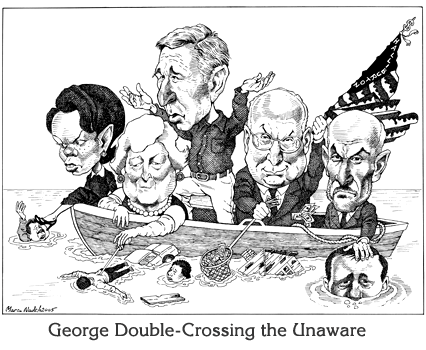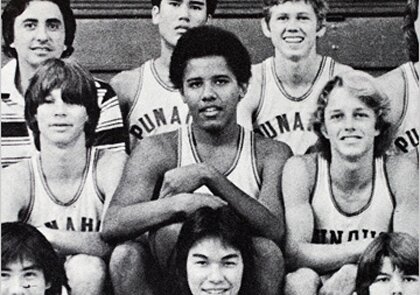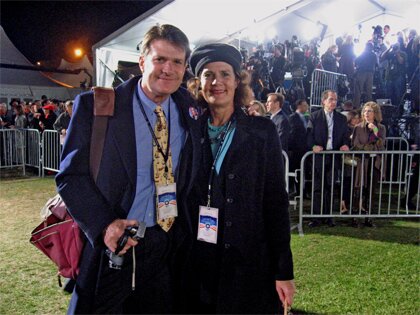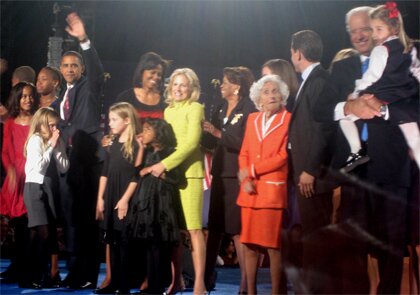There should be a companion term for post-partum depression: post-partum elation. This impossibly long campaign, two years in the running, finished every bit as spectacularly as anyone could have wished: not just a win but a drubbing, not just Ohio but Florida and Indiana, not just a national referendum on the Bush Presidency but a wholesale repudiation. A slam-dunk, as Tenet might say.

Chicago, November 4, 2008 (Photo by Bill Stetson)
Not just Hope for Change, but Change-Elect.
Not just no Vice President Sarah Palin, but a thoroughly distressed Palin brand, a brand still taking hits on a daily basis, from highly placed Republicans. A brand that will wear like a “Members Only” jacket come 2012.
So yes, it’s impossible to walk the streets now without smiling uncontrollably at strangers. Tough to drive to Hannaford’s without suddenly slapping the wheel and shouting “Colorado!” out the window.
Still, in addition to the elation, there’s already something undeniably post-partum about the experience, a certain airy disconnectedness, an inability to pack everything neatly away into memory.
Add to this the typical neurosis of the Left, that we will wake tomorrow to the news that recounts and petty partisan officials in Ohio or Nevada or Broward County have stripped Obama of just enough electoral votes to throw the election back into doubt, and that President Bush has appointed Harriet Miers to look into the matter.
So the disconnectedness of the experience, the joy of it, is also still tinged with electoral post-tramatic stress disorder, silly as that may be.
In all, it’s as though someone has died and willed you a thousand precious things, but the deal is that they’re scattered throughout your house, across every floor and under most chairs and a few of the beds.
And you’ll spend the next week or month sleuthing each of these things out and stowing them away in the neater, sharper categories we call memory or history depending on the scope of the mess at hand.
And until you do, you worry somewhere down deep that someone will come and take them away.
All of which is to say that we have no grand overarching narrative for you about the two-year long Obama campaign, not yet. That will take a while. What we have for you today is an entirely random collection of odd mental bits, things to think about while you microwave your Lean Cuisine, or bleach your grout.
The Triumph of Competence
After Katrina had washed away any remaining reputation for competence that Bush had brought to the White House and augmented with the early war in Afghanistan, Americans turned away in disgust.
Launching a misguided pre-emptive war with Iraq was one thing; people could tell themselves that Bush had better access to covert Intelligence, that even if it was misguided the invasion would make the world think twice about crossing us, that it was happening a world away and wasn’t all that interesting anyway.
But losing a major American city to flood, and seeing its people become high-profile refugees, permanently crippled Bush’s poll numbers.

It was a certain elementary disgust that could not be spun, or finessed. Americans wanted an Administration that could do something, anything, well. Something that wouldn’t come crashing to the ground, leaving a pack of cronies to scurry for holes in other obscure governmental departments.
And so, when presented with a candidate whose campaign itself ran like a Swiss watch, voters perked up. Think about it: the Obama campaign beat not only a field of talented Democrats, but Hillary Clinton; not only Hillary Clinton, but Bill Clinton, and Terry MacAuliffe, the baddest fundraising operation the American political world had ever seen.
And they did it, at least partially, by playing the game better, knowing the rules better. Again, it’s almost impossible to believe that the Clinton campaign foundered on issues of basic political competence: not competing everywhere, as the front-runner; having no Plan B following a disappointing Tsunami Tuesday.
Obama hunted up as many delegates in Idaho as Hillary found in New Jersey. And that shit, as Brad Pitt tells Geena Davis in Thelma and Louise, cannot be taught.
And when reconciliation was called for, Obama reached out, and refashioned a new Party not by pushing the Clintons out but by ranging them alongside.

Later, against McCain, it was the same story: stability and competence and an unwavering message against a campaign that crashed and burned two or three times before finally going up in flames for good.

Americans saw basic competence. And they liked it.
The Triumph of Intelligence
One of the rightest things about Barack Obama, in this moment, was his academic resume: a former professor Constitutional law. A guy who taught the Constitution, to those who didn’t know too much about it.
That, as much as anything, was what I wanted to send to Washington.
Colin Powell seemed to say something similar, at just the right moment in the last weeks of the campaign. He went on Meet The Press as the exclusive guest, because the General had some things he wanted to get off his chest.
Yes, he wanted to endorse Barack Obama for President, and yes, he wanted to make sure that everyone understood he still had a lot of respect for John McCain.
But I think as much as anything he wanted to push back on a lot of nonsense put forward not just over the last eight months, but over the last eight years. So he took the McCain campaign to task for focusing on the trivial, for seeming to divide the country into those who love America and those who don’t. But more surprising to me than anything else was this line, when Powell was asked what specifically affected his choice, and I’ll quote it verbatim:
“I watched Mr. Obama, in recent weeks, and he displayed a steadiness, an intellectual curiosity, a depth of knowledge — in not just jumping in and changing every day, but showing intellectual vigor.”
I almost couldn’t believe my ears: Powell said, out loud, that he preferred Obama in part due to his “intellectual curiosity.”
It was the word “intellectual” more than “curiosity,” of course, that snapped my head around. I’ve become so used to hearing the word “intellectual” used exclusively as a slur, and for a minute I couldn’t make out what Powell was saying.
But the General wanted to make sure no one missed it, and so he repeated himself later in that same quote, broadening the phrase “intellectual curiosity” into “intellectual vigor” — in other words, someone who has the mental desire to seek knowledge, and the mental stamina to stay focused until they’ve acquired some.
Now, let’s remember where we’ve been. Our current President wore his C-average at Yale as a badge of honor. This idea that Bush would make a better President because he got poorer grades was an Up-Is-Down, Weakeness-Is-Strength approach, but it worked pretty well in the end.
This logic said that you could trust George W. Bush, and you couldn’t trust Yale; it said a President, and the voters who put him into office, should always go with the gut instead of the head, emotion not logic, not only because it was a lot less work, but because the gut was bound to be right a lot more often.

And this downgrading of thoughtfulness didn’t start with Bush, by any stretch of the imagination.
There are a lot of strange things in the life of Bill Clinton: the man lost three fathers by the time he was 35, for instance, and was one of the last people in America to shake the hand of John F. Kennedy. But nothing in his biography is stranger than the fact that Clinton’s 1992 campaign had to actively hide the fact that he was a Rhodes Scholar.
The whole “Clinton Can’t Pass a McDonald’s Without Nabbing a Cheeseburger” thing was allowed to take shape partly because it contradicted the picture of an intellectually serious young man from Arkansas, going off to England to study at Oxford, and then at Yale, before settling down to make some serious changes in the way his state was governed.
Obama, on the other hand, was selected as an intelligent man. Not a great bowler. Not the guy who hands you the potato salad at the BBQ. An intelligent man.
The Defeat of Knee-Jerk Machismo
It’s not putting too fine a point on it to note that John McCain turned to a big brawny bald-headed plumber at more or less the same time that ATF officials were breaking up a neo-Nazi skinhead plot to assassinate Barack Obama.
Did John McCain incite the skinhead plot? Not in any direct way. Did he select Joe the Plumber because he was a Central Casting white macho dittohead from Ohio? Yes. And the point is that at some diffuse cultural level, the dogwhistle calls to race and xenophobia and gay-baiting prick up the ears of junkyard dogs too.

Republicans at the national level, and particularly at the Presidential level, have long made knee-jerk machismo their watchword. McCain trotted out Arnold to call Obama “skinny,” to mock his politics and his body in one fell swoop, but it wasn’t as though this was some brainstorm of Steve Schmidt.
Arnold did the same thing for Bush I, and Bush II. He comes in a few weeks before the election and questions the manhood of the Democrat. More palatable to the masses than Coulter’s use of the word “faggot” to describe John Edwards, but the same basic approach: Democrats are weak and womanly, gay or gayer, depending on whether a ballot measure on same-sex marriage is currently pending.

But this time, partially because of the issue of race, those now-standard ploys caught the light in a new way.
So Joe the Plumber, with his grim look and his burly stance and his shaved head, comparing Obama’s “tap-dancing” to Sammy Davis Jr., was revealed for what he was: a big puffed-up bully, a poser without a license, who’d somehow maneuvered himself into a position where his endorsement was to be taken as the endorsement of the white male demographic John McCain coveted.
And Ohio went for Obama. Plumb that, John and Joe.
The Defeat of Democratic Self-Defeatism
In an odd, unhealthy way, Democrats had come to love the image of themselves as a party of Losers. It was a comforting stance, somehow: the party of valiant principle and intellectual heft, constantly attacked and pillaged and left for dead by the Barbarians on the Right.
Florida 2000 never really functioned as a rallying cry for Democrats but as a paradoxical confirmation that we never deserved it in the first place. All of our guiding interpretations involved our own fault, because we were Losers: we didn’t fight hard enough, Al Gore gave up, it was his to lose and he lost it.

And Ohio 2004 strengthened that perception, that if there was an election to be lost, by any losing means necessary, we were just the folks to lose it.
If you thought Barack Obama was targeting America with the phrase, “Yes We Can,” you missed the point: that chant was mostly for Democrats. It was we who needed it repeated for 18 months before it finally sank in.
Republicans already knew they could.






















